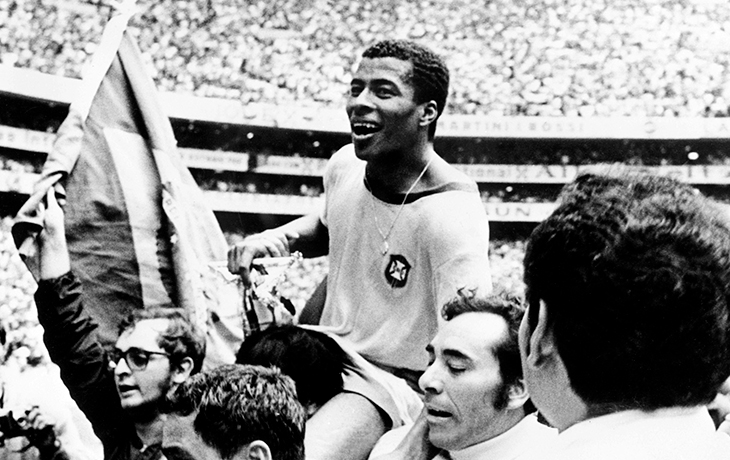Sambafoot publishes a retrospective of every World Cup edition as a warm-up for the 2022 competition. This week, we discuss the ninth edition, which took place in 1970.
In 1970, the World Cup made its way to North America for the first time in 40 years. The Brazilian squad had the chance to redeem itself in the World Cup in Mexico after their disappointing performance at the previous tournament.
One of the best soccer teams ever played was seen by the whole globe between May 31 and June 21 on colour television. Pelé was the greatest intellect of all the stars. Recall the third championship’s results!
How was the 1970 World Cup?
After winning the election against Argentina, Mexico were chosen as the host nation. The 1968 Olympics were held in Mexico City, which benefited the event’s structure.
Adaptations were made because it was the first World Cup to be broadcast in colour. The main one is that some games were played in Mexico at noon in sweltering heat.
Four groups of 16 teams were maintained as the format. Brazil were unquestionably one of the favourites, although the Soviet Union, Italy, England, and Germany all had solid possibilities to win the championship.
Some sporting events have made history. One of them competed in the semifinal matchup between West Germany and Italy. Before Karl-Heinz Schnellinger’s equalizer in stoppage time, the Italians had a 1-0 lead.
Up to Italy’s 4-3 triumph, there were several twists and five goals scored in extra time. The “Game of the Century” is this one.
Pele also immortalized two other football moments. Gordon Banks’ Defense of the Century comes first. Then, when he took a shot from midfield against Czechoslovakia, it was dubbed “The Goal Pelé Didn’t Score.” The odd thing is that none of them resulted in a goal.
The Champion’s Campaign
Along with the defending champions England, Romania, and Czechoslovakia, Brazil were placed in Group 3. The 4-1 win against the Czechoslovakians in their debut demonstrated the calibre of the Zagallo-coached squad.
The first phase ended with three Brazilian victories (1-0 in England and 3-2 in Romania). Unbeaten, Brazil advanced to the final against Italy after defeating Peru (4-2) and Uruguay (3-1).
Then, the 4-1 thrashing of the Europeans clinched the third title in one of the games that fans remember the most. The fourth goal, by Carlos Alberto Torres, is iconic.
Brazilian team is considered one of the best in history
Opinions differ on the subject of the best sports team in history. Even so, it would be unthinkable to exclude the Selection of 70 from this list.
For instance, the five attacking players—Gérson, Jairzinho, Pelé, Rivellino, and Tosto—each had the number 10 jersey for their respective teams. Among the greats of Brazilian football’s defensive line are Carlos Alberto Torres and Piazza.
The key distinction is that this squad, as opposed to previous teams, won the championship (1982 and 2006, for example). Finally, Pele won his third title, cementing his status as the greatest player in history.
Awards and Trivia
Pele was chosen as the World Cup’s best player during the ninth iteration. Gerd Müller and the “Gold Left Hand” Gerson split the bronze and silver balls, respectively.
With 10 goals scored, the German led the field in scoring. With 14 goals overall, he is the third-highest scorer in World Cup history (he made another four in the 1974 edition).
The most talented young player was Teófilo Cubillas of Peru. In the quarterfinal matchup against Brazil, the former midfielder scored a goal. The top goalkeeper was Uruguayan Ladislao Mazurkiewicz.
Ideal team
The ideal team for the 1970 World Cup had six Brazilians: Ladislao Mazurkiewicz (Uruguay), Giacinto Facchetti (Italy), Piazza (Brazil), Franz Beckenbauer (Germany), Carlos Alberto Torres (Brazil), Gérson (Brazil), Roberto Rivellino (Brazil) ), Bobby Charlton (Brazil), Pele (Brazil), Gerd Müller (Germany) and Jairzinho (Brazil).
Key numbers
- The 1970 World Cup was the first to have cards. Evgeny Lovchev of the Soviet Union was the first to receive a yellow card.
- In addition to cards, this was also the first World Cup to allow substitutions during matches. The coach could put two players from the bench. Before, whoever started should finish (even in case of injury).
- Jairzinho scored a goal in all World Cup matches. He finished as second leading scorer with seven goals.
- Zagallo was the first to win the World Cup as a coach and player.
- Carlos Alberto Parreira and Cláudio Coutinho, who participated in the delegation as physical trainers, were coaches of the Brazilian National Team in future World Cups.





